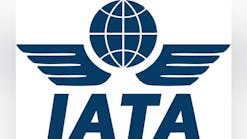IATA Resolution 753 was created to improve the baggage handling process. The resolution requires that baggage be tracked at four specific areas throughout its journey, including at check-in, when loading onto the aircraft, during transfers and upon arrival at the delivery belt.
“The end result, following a successful implementation of the Resolution 753, should be to have a visible reduction in the baggage mishandling rates for the airline, the airport or the ground handler who is following the resolution,” Timos Korosis, airport system and ground product developer at Aegean Airlines, explained during a recent IATA webinar titled “Ensuring Efficient Baggage Operations Through Standardization.”
During the webinar, Korosis and Mohamed Arshad Khan, special airport system – senior design lead at Abu Dhabi Airport, highlighted some of the benefits that come with implementing Resolution 753.
“In 2022, there were 58 million bags mishandled worldwide, which is a 20 percent decrease from the 72 million baggage mishandled in 2018,” Khan pointed out, noting the advantages of collaborating between stakeholders. “In the same year, 2022, 95 percent of checked bags were tracked accurately throughout the baggage journey, of course thanks to the R-753, which is a 15 percent increase from the 80 percent of the checked bags that were tracked accurately in 2018.”
““Benefits don't stop with just numbers. We can say that there are a lot of sectors that benefit from this resolution – starting with operations,” Korosis added. “By implementing Resolution 753, we were able to roll out new automated processes and reduce manual workload, which was very, very important for us.
“At the same time, those new processes were able to give us new data. This data availability, combined with the process automation, ensured that we were able to offer the same homogenized – as we can call it – service throughout our network, without needing to think, ‘Where are we flying to?’, ‘Which ground handler?’, ‘Which is our partner at this specific airport?’”
In turn, Korosis said knowing where a bag is at all times allowed the airline to mishandle fewer bags. This, in turn, lowers Aegean’s operational costs at every airport.
Resolution 753 also improves the passenger experience. The automated processes implemented with the resolution coupled with the available data allowed the airline to build new products. These included live baggage tracking, which enables passengers to track their baggage throughout the journey, and automated delayed baggage notifications.
“When things don't work as we want them to and we do mishandle a bag, we are able to repatriate this bag quicker than before,” Korosis said. “This means that passengers have to wait less and they are reunited quicker – possibly the same day – with their bag.”
Resolution 753 implementation also allows for access to advanced data analytics, which enable remote KPI monitoring.
“So centrally, we would know what's happening to every airport in our network. Then, using this data, we were able to get feedback and improve our airport automations based on informed data decisions and all the data that we collected by implementing Resolution 753,” Korosis explained.
Khan added the benefits for airports are numerous, as well.
“It starts from reduced baggage mishandling, which is I think the key element which becomes the pillar for the rest of the elements,” he said.
Additional benefits include reduced baggage delivery time, improved customer satisfaction and reduced cost because processes are streamlined and efficiencies have increased.
“Most importantly, there is an element of improved safety in the overall journey of the baggage, so that's the major benefit from the airport perspective,” Khan said.









